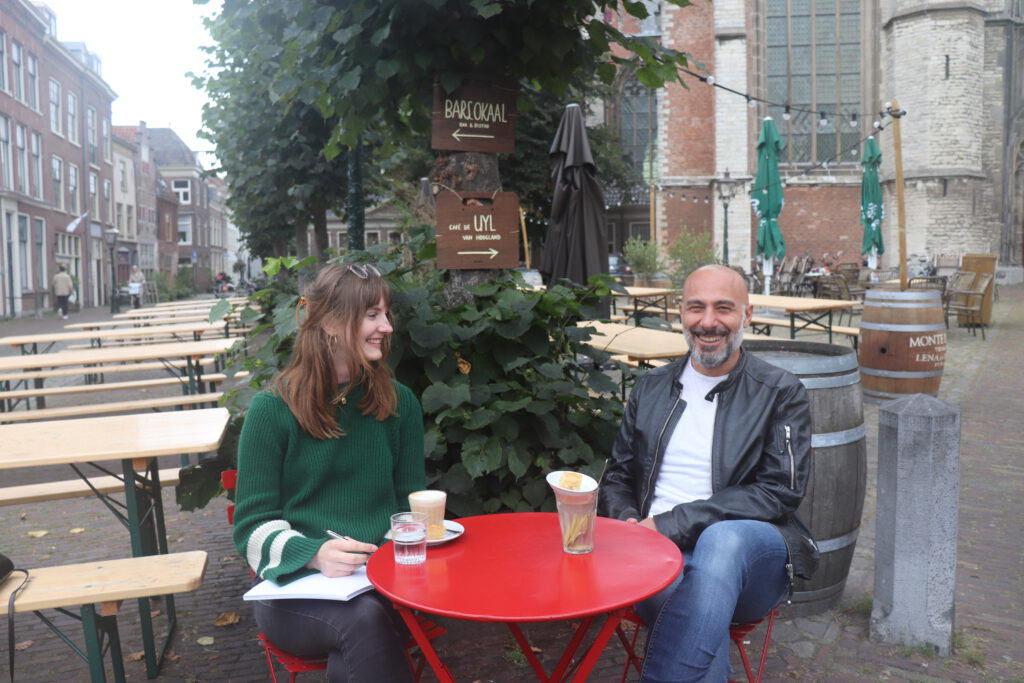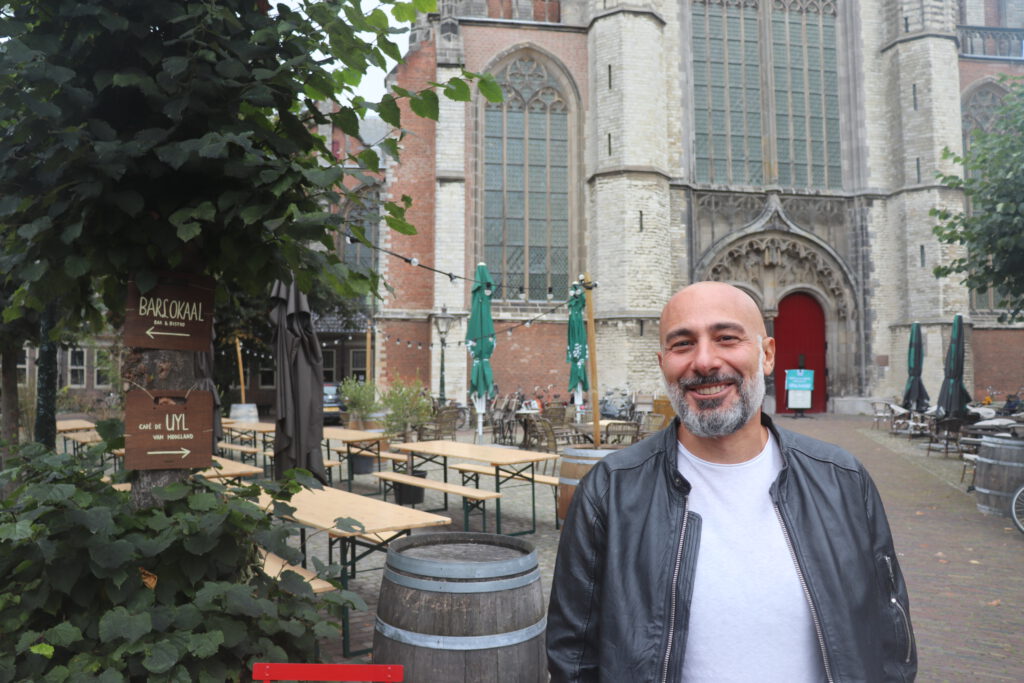Moving to the Netherlands likely has meant that you’ve had to find new connections — with the people around you, the Dutch culture, and yourself.
But, during the time that you’ve lived here (be it a day or decades), have you ever paused to think about how you create and maintain those connections?
We sat down at Bar Lokaal (one of our favourite cafés in Leiden!) to have a chat with Luca Grasso about Nonviolent communication, coaching, and human connection. You know, all those deep thoughts that come when you’re a fresh international in the Netherlands — or just any human trying to live your best life in this day and age.
Introducing Luca, an international coach in Leiden
Originally hailing from Italy, Luca has now been living in the Netherlands for 20 years. As we strolled across the church square to the terrace, he told us how he spent his earlier career immersed in corporate life. However, once he became increasingly interested in the way people communicate with each other, corporate life seemed less meaningful to him.
That doesn’t mean he jumped ship from one job to the other. Rather, he gradually learned about Nonviolent communication (which we’ll chat more about later 😉) in order to improve his own relationships. And as he saw the results of its application, he wanted to share his tools with others.
So, Luca began giving courses and workshops to friends, became a certified coach and Nonviolent communication trainer and, ultimately, ditched corporate to found his coaching agency, UP!. 🙌
UP! is a coaching agency with a twist. Luca combines traditional coaching with Nonviolent communication training, making sure that it’s appropriate on a client to client basis.
What is Nonviolent communication?

Chatting to us on the terrace with a cup of hot tea in front of him, Luca told us that Nonviolent communication (NVC) is “a language of collaboration.”
He explains that it’s based on the principle that communication can unite us or divide us and that practising Nonviolent communication “allows human beings to have better, richer, relations with one another — relations through which they can empathise with each other rather than judging their own behaviours and actions.”
Sounds like we could all need some more of that!
How do you teach NVC?
After gaining a better understanding of what NVC is, we wanted to know more about how Luca works with it. UP! offers both coaching services (often interwoven with some NVC) as well as Nonviolent communication training — for individuals, couples, and groups.
He told us about the formalised NVC techniques for creating connections between people such as (actually) listening, paraphrasing, and making intentions clear to one another, but says “there is no clear roadmap and it takes time to create a connection.”
For example, in Luca’s experience of working with couples, people sometimes think they are already connected while, in reality, they aren’t really listening to each other. (Like when you tell your partner about your day and they are too caught up in their phones — reading DutchReview 😉).
“Sometimes it takes 10 weeks of nonviolent communication training for them even to see that there is a disconnect between them.” He says “they don’t realise that a disconnect has somehow sneaked into their relationship until they’ve experienced what connection truly looks like” and assures us that such experiences are completely normal when a couple is doing NVC training together.
Luca emphasises that rather than focusing on the “rights and wrongs” of the discussed situations, NVC is rooted in the raw facts of what happened: “It’s about using what happened to create an empathetic space where people can listen to each other’s feelings, without taking responsibility for the feelings of others,” he continues.
What makes UP! different from other coaching agencies?

“During the coaching, there is a relentless focus on self-empathy. I support the client in what’s essentially a careful research exercise into themselves and the narratives they tell about their life.”
Luca continues: “by flooding each session in an abundance of empathy, I encourage clients to be inquisitive about their relationship with themselves and others.” He clarifies that “empathy isn’t about pity but rather about researching the truth. It’s about taking responsibility for our own narrative and stepping up in order to change it if the narrative doesn’t serve us.”
Essentially, if you want to change your life, you need to take action and stop making excuses for yourself (or others).
Sitting and chatting with Luca on a rainy day (which could be any day in the Netherlands, to be honest) clearly showed his abundance of empathy. Certainly brightening our day, his easy smile and insightful thoughts made us curious to learn more about nonviolent communication ourselves…So, naturally, we bombarded him with questions. 🙈
One thing that struck us about UP! is that Luca doesn’t adhere to traditional coaching categories such as “life coach”, “career coach”, etc. He explains that oftentimes “when we make categories out of peoples’ challenges, we simplify them.”
So, to avoid dismissing the multifacetedness of peoples’ experiences and their understanding of life, Luca takes a more person-centred approach to coaching. He finds that focusing on empathy for oneself and others is what really gets to the core of what makes people seek out coaching in the first place.
He shared that “in many instances, once we get to the root of what is bothering people, it boils down to — not one’s career or health — but the connection with oneself and others and how we take responsibility for our own emotions and reactions.”
How does UP! help internationals in the Netherlands?
Just as Luca doesn’t believe it’s beneficial to categorise his coaching practice, he doesn’t differentiate between internationals and Dutch folks. He explains that “people’s distress and challenges are common across all cultures. Creating culture-based distinctions can often lead to superficial, and thus inaccurate, explanations for our feelings.”
So, to cultivate the responsibility that is crucial in coaching, Luca works with the way people feel. There are enough boxes and labels in the world anyway, right? 💁♀️
That said, there are some common themes he encounters when working with clients. Namely, indecisiveness and a sense of guilt. And if you winced when reading those, we feel ya — they are uncomfortable topics but also familiar to many of us.
Finally, what is one tip you would give to internationals in the Netherlands who are considering completing a coaching or NVC program?
Getting ready to head back out into the rainy Dutch weather, we asked Luca if he had any tips for people who want to embark on a Nonviolent communication or coaching journey. He smiled and said: “Ask yourself: Are you ready to explore? Because it takes commitment, curiosity, and a good dose of playfulness.”
If you are indeed ready to explore (and live near Leidse Hout) then Luca has a workshop about Nonviolent communication coming up on November 14 that you don’t want to miss!
Connect with Luca! If you’re interested in beginning your own inwards journey, or just want to hear more about the UP!, coaching, and nonviolent communication, contact Luca.
What’s your experience of finding connection in the Netherlands? Tell us in the comments below!